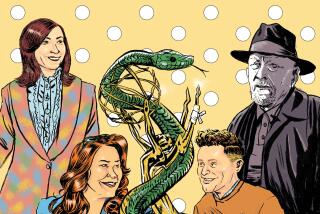Taping Stories of TV Pioneers
- Share via
Those who work in television are accustomed to operating at a frenetic pace, but a small staff in a nondescript North Hollywood office faces a different sort of race against time.
The recent deaths of Milton Berle, programming innovator Sylvester “Pat” Weaver and “The Fugitive” creator Roy Huggins offer reminders that the television business’ pioneering generation is gradually passing on, instilling a greater sense of urgency in those assembling the Archive of American Television, an ambitious effort to preserve on video the memories and insights of those who gave birth to and shaped the medium.
Under the aegis of the Academy of Television Arts & Sciences Foundation, the archive has taped unedited broadcast-quality interviews--ranging in length from three to seven hours--with 265 TV pioneers, ranging from actors and producers to editors and engineers, totaling nearly 900 hours of footage.
Bob Hope recently donated $1 million to help finance the venture, which is still wrestling with funding to continue conducting interviews, digitize them and begin making the material accessible to a wider audience.
“We felt this was really a worthwhile program, not just for the foundation but the industry,” said TV Academy Foundation Chairman Thomas Sarnoff, the son of Gen. David Sarnoff, who founded NBC. “Nobody else was chronicling the history of television through the eyes and words of the people who created and developed it.”
The project was initiated in 1996, when then-Disney Television executive Dean Valentine took the idea to Richard Frank, the former president of the TV academy and Disney Studios.
Valentine drew inspiration both from his friendship with writer-producer Danny Arnold--who, before his death in 1995, regaled him with show-business anecdotes from his career, which included “Barney Miller” and “Bewitched”--and from Steven Spielberg’s Shoah Foundation. The foundation documents the stories of Holocaust survivors, many of whom, like the TV industry’s pioneers, are now in their 70s and older.
The long-term goal is to make the television archive available via a central location as well as on the Internet, establishing a database for university students, libraries and TV viewers around the world.
Executive producer Michael Rosen, who oversees the archive’s few employees from new offices adjacent to the TV academy in North Hollywood, said sessions are meticulously researched and don’t shy away from topics that portray Hollywood in a less-than-flattering light, such as the blacklisting during the McCarthy era.
Moreover, Rosen sees the archive’s appeal extending beyond television to 20th century history. Someone interested in John F. Kennedy’s assassination, for example, will eventually be able to access interviews with Walter Cronkite, Robert MacNeil and “60 Minutes” producer Don Hewitt, who covered the story and shared recollections of that day during their interviews. Many subjects also reminisce about the Great Depression’s influence on their lives or about the advent of television.
“These interviews are seen as archival documents.... The best way to look at it is an interactive encyclopedia,” Rosen said.
The archive’s current schedule calls for taping 50 interviews a year, with a committee of industry volunteers, in consultation with various academics, selecting candidates from a wish list of more than 1,000 names. Those already interviewed include Berle, Steve Allen, Sid Caesar, Carl Reiner, Aaron Spelling, Sheldon Leonard, “I Love Lucy” writer Madelyn Pugh Davis, Ted Turner, Grant Tinker, Mary Tyler Moore and Dick Van Dyke.
“Looking back, I’m somewhat disappointed we didn’t start this sooner,” Sarnoff said. “We’re trying to pick up, to the extent we can, interviews with people who have passed away who we didn’t get so we can include them.”
An interview was conducted with ABC founder Leonard Goldenson, for example, who died in 1999 at the age of 94; however, the archive was initiated after the deaths of NBC’s Sarnoff, CBS patriarch William S. Paley and many others. Thomas Sarnoff has provided tapes of interviews with his father, while Johnny Carson’s company donated interviews with Jack Benny and George Burns.
“It’s a constant, ticking clock that is running after us,” Rosen said.
Even within the TV industry, the archive is still a relatively well-kept secret. Some footage has been licensed to A&E;’s “Biography” series and E! Entertainment Television, and nostalgic cable network TV Land has been running 30- and 60-second interstitial segments relating to classic TV series culled from the interviews.
Still, organizers say they remain a long way from their ultimate goal, which includes both increasing the pace of the interviews and finding a secure way to disseminate them, as Rosen put it, that will “take it out of a dusty room and make it accessible.”
The foundation received $1 million from ABC at the outset and has picked up smaller donations in addition to the recent grant from Hope.
Fund-raising, however, has not come easily--prompting Sarnoff, who as a child was featured by his father in an early demonstration of TV technology, to suggest that current industry leaders are apathetic toward a program that Rosen compares to having the opportunity to hear Mozart discuss classical music or Shakespeare, literature.
“It’s not like pulling teeth; it’s like pulling arms and legs,” Sarnoff said. “They don’t really seem to care, or understand, what their own history was.”
Although the TV academy is best known for honoring television with its annual presentation of the Emmy Awards, the foundation’s ancillary activities include sponsoring internships, handing out awards to college filmmakers and orchestrating seminars for college and university faculty.
“The academy focuses on the present,” Sarnoff explained. “The foundation concentrates on the past and the future. This archival program is not just about the past, but it’s the future too.”
More to Read
The complete guide to home viewing
Get Screen Gab for everything about the TV shows and streaming movies everyone’s talking about.
You may occasionally receive promotional content from the Los Angeles Times.






